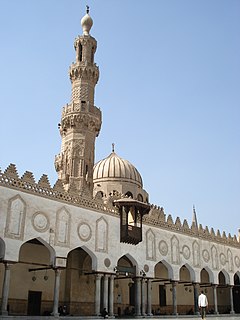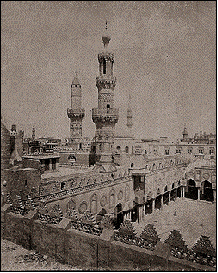A tariqa is a school or order of Sufism, or specifically a concept for the mystical teaching and spiritual practices of such an order with the aim of seeking haqiqa, which translates as "ultimate truth".

Al-Azhar University is a university in Cairo, Egypt. Associated with Al-Azhar Mosque in Islamic Cairo, it is Egypt's oldest degree-granting university and is renowned as the most prestigious university for Sunni Islamic learning. In addition to higher education, Al-Azhar oversees a national network of schools with approximately two million students. As of 1996, over 4,000 teaching institutes in Egypt were affiliated with the University.

Islam is the dominant religion in Egypt with around an estimated 90% of the population. Almost the entirety of Egypt's Muslims are Sunnis, with a small minority of Shia and Ahmadi Muslims. The latter, however, are not recognized by Egypt. Islam has been recognized as the state religion since 1980. Since there has been no religious census, the actual percentage of Muslims is not known: the percentage of Christians are estimated to be between 10 and 15%.
The Khalwati order is an Islamic Sufi brotherhood (tariqa). Along with the Naqshbandi, Qadiri and Shadhili orders, it is among the most famous Sufi orders. The order takes its name from the Arabic word khalwa, meaning “method of withdrawal or isolation from the world for mystical purposes.”

The House of Representatives is the lower house of Egypt's bicameral parliament.

The Democratic Unionist Party, also referred to by itself as the Original Democratic Unionist Party, is a political party in Sudan, closely tied to the Khatmiyya Sufi order.

Sufi Abu Taleb was an Egyptian politician. He served as Speaker of the People's Assembly from 1978 to 1983 and, following the assassination of Anwar El Sadat on 6 October 1981, assumed the duties of acting head of state for eight days, until the accession of Hosni Mubarak.

The 1963 Syrian coup d'état, referred to by the Syrian government as the 8 March Revolution, was the successful seizure of power in Syria by the military committee of the Syrian Regional Branch of the Arab Socialist Ba'ath Party. The planning and the unfolding conspiracy was inspired by the Iraqi Regional Branch's successful military coup.

Ahmed Mohamed Ahmed El-Tayeb is an Egyptian Islamic scholar and the current Grand Imam of al-Azhar and former president of al-Azhar University. He was appointed by the Egyptian President, Hosni Mubarak, following the death of Mohamed Sayed Tantawy in 2010. He is from Kurna, Luxor Governorate in Upper Egypt, and he belongs to a Sufi family.

The al‑Nour Party, or "Party of The Light", is one of the political parties created in Egypt after the 2011 Egyptian Revolution. It has an ultra-conservative Islamist ideology, which believes in implementing strict Sharia law. It has been described as the political arm of the Salafi Call Society, and "by far the most prominent" of the several new Salafi parties in Egypt, which it has surpassed by virtue of its "long organizational and administrative experience" and "charismatic leaders". Its political aim is to establish a theocratic state on the lines of Wahhabism like in Saudi Arabia. Saudi Arabia was found to be the main financer of the party according to the public German television news service ARD (broadcaster).

The Egyptian Bloc was an electoral alliance in Egypt. It was formed in August 2011 by several liberal, social democratic, and leftist political parties and movements, as well as the traditional Islamist Sufi Liberation Party to prevent the Muslim Brotherhood, and its affiliated Freedom and Justice Party from winning the parliamentary election in November of that year. As of September 2012, all former constituent parties left the bloc, joined other alliances or merged into other parties.

The Ansar, or followers of the Mahdi, is a Sufi religious movement in the Sudan whose followers are disciples of Muhammad Ahmad, the self-proclaimed Mahdi.
Renaissance Party may refer to:
The Egyptian Liberation Party is a Sufi political party in Egypt. The party was founded by Sheikh Aboul Azayem; most of the members are part of the Al Azmeya Sufi order. The party is backed by the ‘Azmeyya Tareeka Sufi order.
The Voice of Freedom Party is a Sufi Islamist political party in Egypt The party is backed by the Rifa'i Sufi order, which is the largest Sufi order in Egypt.
The Victory Party is a Sufi political party in Egypt.
Muhammad al-Sufi is a former field marshal in the Syrian Army, who played a role in the 1963 Syrian coup d'état and briefly served as Defense Minister between March and May of that year. Politically a Nasserist, he was sidelined by Ba'athist rivals in the military and departed the political scene before returning to Syria in the 1990s.
The Consciousness Party, also translated as the Awareness Party, is a political party in Egypt founded in 2011. The party was originally part of the Egyptian Bloc alliance that ran in the 2011-2012 Egyptian parliamentary election, though only three parties were ultimately part of that alliance. The party was almost last in Ismailia Governorate during that election.
At 1:50 PM EET on 24 November 2017, the al-Rawda mosque was attacked by roughly 40 gunmen during Friday prayers. The mosque is located in the village of Al-Rawda east of the town of Bir al-Abed in Egypt's North Sinai Governorate. It is one of the main mosques associated with the Jaririya Sufi order, one of the largest Sufi orders in North Sinai. The Jaririya order is named for its founder, Sheikh Eid Abu Jarir, who was a member of the Sawarka tribe and the Jarira clan. The Jarira clan resides in the vicinity of Bir al-Abed. The attack killed 311 people and injured at least 122, making it the deadliest attack in Egyptian history. It was the second-deadliest terrorist attack of 2017, after the Mogadishu bombings on 14 October. The attack was universally condemned by many world leaders and organizations.









